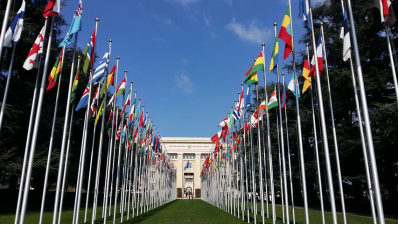As part of its overall objective to better structure its research activities in international water law and increase its relevance in terms of current global problems, the Academy has devised an innovative research project aimed at identifying, rigorously analysing and better comprehending transboundary water issues. Using the legal notion of ‘convergence’ as the analytical tool, the project will draw together the wide range of applicable legal frameworks and practices in this field. Professor Owen McIntyre leads this initiative, supported by contributions from the Affiliates across the four broad Research Interest Areas selected by the Academy. The RIAs include:
International Water Law and
1. Climate Change, Environment and Natural Resources Law
2. Multi-level Water Resources Governance
3. International Economic Law and Water Resources Management
4. The System of International Law
Why ‘convergence’? As the global community faces existential threats to peace, security, environmental and human health, and economic prosperity, national governments find it difficult to cope with these challenges. International law is in the process of transformation, affecting national policies and actions across the board, including management of declining quality and quantity of shared freshwater resources. Thus, one fundamental question which must be answered is whether international law is fit-for-purpose to address contemporary and future problems in this field.
As the scope of application of international law is expanding, and as the body of norms has diversified and grown in complexity, the risk of ‘fragmentation’ of international law has also increased. The co-existence of various specialised and autonomous, yet overlapping legal regimes reduces their complementarity and may lead to conflict. However, the systemic coherence of international law appears to be maintained by a counteracting integrative process of legal ‘convergence’, by means of which diverse specialised fields of law inform and influence each other’s normative evolution. Thus, the development of modern international law appears to involve an inherent dialectic between the interdependent processes of fragmentation and convergence, which responds to the need to contain the diversity inevitably arising within an increasingly extensive and specialised legal system. While fragmentation addresses the problems of sophisticated inter-State interactions in an progressively complex world, convergence restrains international law’s disintegration to preserve the requisite degree of systemic unity and normative coherence.

Whereas the legal notion of ‘fragmentation’ has received extensive academic attention , the phenomenon of ‘convergence’ can be linked to several institutional agents and legal processes, which act to foster and promote the systematisation and coherence of rules across all specialist fields of international law. Notably, the International Court of Justice (ICJ) uses its central position as the principal judicial organ of the United Nations system to play a unifying role, while the International Law Commission (ILC) elaborates multilateral agreements based on codification of the law and identification of optimal legal solutions, thereby promoting homogeneity and universality. Certain quasi-constitutional processes embedded into the fabric of international law also foster convergence, such as the principle of ‘systemic integration’ applying to the interpretation of treaties pursuant to Article 33(1)(c) of the Vienna Convention on the Law of Treaties, which facilitates cross-fertilisation between specialist sub-fields. In addition, the ever-growing prevalence, procedural sophistication, and hierarchical claims associated with certain sub-fields, such as international human rights or environmental law, contribute further to normative cross-fertilisation.
In exploring the myriad causal factors and diverse legal processes driving the legal phenomenon of ‘convergence’, it is helpful to focus upon recent experience in international water law as a specific sub-field of international law which, despite its dynamism and growing specialisation, doesn’t appear to be retreating from the generalised parameters of international law into an autonomous and compartmentalised regime. In the course of its ongoing development, it interacts intensively with a wide range of other sub-fields of international law, from which it readily borrows and assimilates values, whilst itself offering normative principles and approaches which are increasingly relevant to other sub-fields. The practice of modern international water law increasingly involves institutional arrangements designed to facilitate dynamic and intensive interaction with other related sub-fields, thus requiring that any normative incompatibility be addressed.
![]() Tel: 86-027-68756726
Tel: 86-027-68756726
![]() Address: Wuhan University China Institute of Boundary and Ocean Studies (CIBOS), P.R. China,
Address: Wuhan University China Institute of Boundary and Ocean Studies (CIBOS), P.R. China,
© International Water Law Academy. All Rights Reserved.